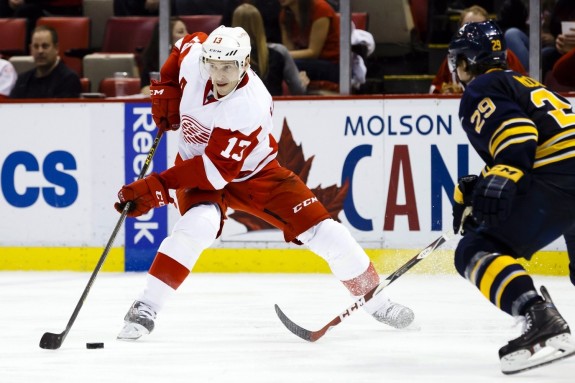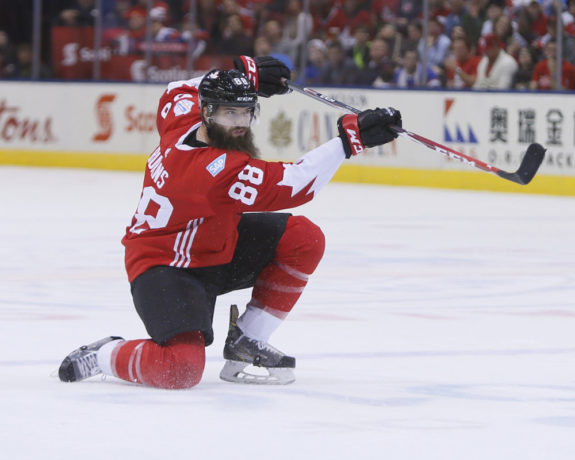The Frank J. Selke Trophy, more commonly referred to as simply the Selke Trophy, is a distinction awarded to the NHL forward who demonstrates the most skill in the defensive component of the game. Previous winners of the award range greatly in age, skill and position, yet remain considered to be amongst the most valuable and highly skill forwards in the game.
One of the most notable and frequent winners of the Selke was Bob Gainey, a long-time Montreal Canadiens star who captured the award on four separate occasions – the most in NHL history to date. In fact, perhaps the Selke has long enjoyed the storied history and culture of Montreal, as Guy Carbonneau, a legend with the team, also won the trophy three times.

However, despite the incredible history of the award, its winners and, having been in circulation since the 1977-78 season, the Selke Trophy has slowly become one of the league’s less notable awards. With the Art Ross, Vezina, James Norris and Calder Memorial trophies dominating the public eye, the Selke Trophy has, unfortunately, faded from popularity due to its overwhelming counterparts.
Yet, despite this fact, the award itself still retains immense value given its ability to spotlight the easily overlooked skills utilized by NHL forwards defending their own zone.
Patrice Bergeron is a Selke Trophy finalist again. He’s won the award three times. https://t.co/CMcUz07OzF pic.twitter.com/e5ruRBoM5w
— NESN (@NESN) April 19, 2017
But, have you ever wondered why the NHL doesn’t present a similar trophy to defensemen? No, not the Norris Trophy but rather a distinction which highlights, like the Selke Trophy itself, the unexpected qualities which a given defender may bring to the table – in this case, offensive capabilities.
Simply put: if there is a specific trophy which highlights the defensive efforts of forwards, shouldn’t there be a distinction which, in turn, highlights the offensive contributions of defensemen?
Making the Case
Although the introduction of a trophy which strictly rewards the lethal offensive play of defensemen may sound like a gimmick, it truly isn’t and for a number of reasons.
Firstly and above all else, there is the situation of the Norris Trophy.
Awarded to the defender who demonstrates the greatest all-around ability at his position, the trophy and its recipients have garnered a great deal of controversy in recent seasons. While the winner is selected based on the criteria mentioned above, a clear tendency has developed in which voting favors those who can produce offensively at a high rate, regardless of their individual work defensively.

There was, perhaps, no case stronger than just two seasons ago in 2014-15, when Erik Karlsson and Drew Doughty battled for the distinction. On one hand, there was Karlsson who, through 82 games, scored 66 points – 30 of which came on the power play – and 21 goals. On the other hand, there was Doughty who amassed just 46 points – 17 of which on the powerplay – but was, arguably, the stronger player defensively.
In fact, in said season, Doughty played a much greater amount of ice time than Karlsson and in tougher defensive situations. In addition to averaging 28:59 per game throughout the campaign, Doughty logged 2:38 of short-handed ice-time per contest in comparison to Karlsson’s 0:33 – a total which ranked 460th overall in the NHL. Further, come the end of the season, Doughty’s CorsiFor% (CF%) of 55.7% had remained significantly higher than Karlsson’s mark of 52.8%, indicating Doughty’s ability to not only dissolve scoring chances at a higher rate but also to create them despite registering fewer points.
Drew Doughty gets the most first-place votes, still loses the Norris to Erik Karlsson: http://t.co/AmT6e0ZCch pic.twitter.com/mivkqSnEuu
— Jewels frm the Crown (@JFTC_Kings) June 24, 2015
To provide even greater context, Doughty’s CF% ranked fourth best amongst NHL defensemen in 2014-15, while Karlsson’s mark placed him 51st, respectively. Now, by no means is this analysis being done in order to bash Karlsson and promote Doughty, however, the statistics produced by both players during this campaign clearly indicate Doughty as the more capable and, arguably, stronger defenseman.
Given that the award is based on all-around play, it is undoubtedly clear that Doughty was the stronger defender in this case. Logging major minutes as a defensive stalwart, Doughty produced a greater season statistically and was sensational at both ends of the ice. In fact, the only major category in which Doughty trailed Karlsson was in points, however, as we have seen, Doughty’s CF% indicated him as a stronger possession player and one whose presence naturally generated greater offensive opportunities than Karlsson.
Regardless of these facts, Karlsson captured the Norris Trophy, a win which only fuelled greater controversy surrounding the distinction, its criteria, and the general manner in which it has come to be awarded.
Shouldn’t the winner go by 1st place votes? Doughty got 9 more than Karlsson. #Norris #NHLAwards
— Tim Langlois (@timlanglois) June 24, 2015
Paradigm Shift
Historically, NHL defensemen have not been bred and developed to score points.
Given the fact that their positional focus is on the deconstruction or complete elimination of opposing scoring chances, defensemen have long sacrificed offensive glory in return for solidarity in the defensive zone. However, as the game itself has progressed and grown, so too have the abilities and responsibilities of the players who traverse the ice.

While those defending their own zone were long focused strictly on defense, the NHL game and its defensemen have been forced to adapt to the ever-increasing skill and speed of the product on the ice. With the current state of the game structured upon both lethality and ferocity, modern-day defensemen are now focused on offense more than ever before given its importance and, at times, rarity in the league.
As a result, the typical, classical role of defensemen has been tossed aside, with a new breed of highly skilled offensive defensemen saturating the NHL ranks. Of course, it goes without saying that strong, stay at home defenders are still crucial to the success of a given team, however, their presence, such as that of fighters in the NHL, appears to be on the decline.

So, with the defensemen of today emphasizing offense more than ever before, does it truly make sense to reward a chosen defender with a trophy which recognizes defensive play? In fact, some of those considered to be amongst the best defensemen in the NHL today are arguably poor defensive players, yet, due to their offensive flair, have long remained in the discussion for the Norris Trophy.
The New Trophy
As we have seen, a new individual trophy which strictly recognizes the offensive play of a given NHL defenseman is needed now more than ever before.
At this point in time, the Norris Trophy is no longer being awarded accurately based on its criteria. Designed to be awarded to the best all-around defender, the Norris Trophy is habitually being awarded to those who excel strictly in the offensive aspect of the game derelict of their defensive capabilities. As such, the award no longer recognizes the greatest defenseman but, at times, strictly the most lethal offensive blue liner.
ICYMI: Is it just offense that wins the James Norris Memorial Trophy? #nhlawards https://t.co/BgTV4BznKZ
— Jeff Ponder (@jponder94) March 31, 2017
However, it must be said that this issue is the fault of no one, as the game itself has simply developed into a highly complex beast which, at its heart, is driven by the necessity for goals in an increasingly offensively challenged league. With scoring coming at a premium, the typical role of a defenseman has suddenly yet significantly adapted to meet the ever-changing requirements for success at the NHL level.
As a result, the NHL should, ideally, award two distinct trophies to its standout defensemen.
On one hand, there is and can remain the Norris Trophy. Altered to be awarded specifically to the defenseman who best excels at the defensive component of the game, this trophy would truly and accurately reflect the strong and consistent play of a given defender within his own zone. With offensive abilities no longer considered, this award would now be distributed based on strong possession statistics, takeaways, blocks, time on ice in varying situations and, rather simply, any other metric necessary in evaluating defensive performance.

On the other hand, there would be the new award which has yet to be named.
Awarded to the NHL defenseman who best excels at the offensive component of the game, this trophy would reflect the lethal offensive abilities of a given defender and his ability to produce consistently over the course of a given season. With defensive play not considered, this new trophy would be awarded and based strictly on the offensive production of a given player and be measured by his goals, points, points per 60 minutes, general value on the power play and any other relevant metrics.

While the introduction of this trophy remains a long-shot at best, developing a new award to differentiate between the high-end offensive and defensive abilities of NHL defensemen would undoubtedly be a worthwhile cause. With the conflict surrounding the awarding of the Norris Trophy having developed into somewhat of an annual crisis, introducing a new award would not only quiet this discourse but, in doing so, more accurately represent the incredible, varying abilities of the NHL’s defensemen.